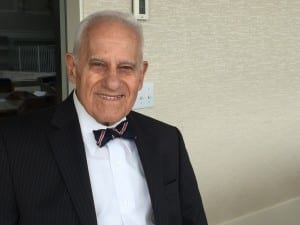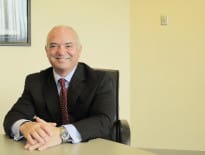Haig Der Manuelian
Title: Attorney, Holland & Knight
Age: 90
Experience: 69 years
Haig Der Manuelian claims he was disappointed in himself when, at just three days old, he realized he hadn’t accomplished anything yet. In the intervening years, he has worked hard to make up for that. A partial list of his accomplishments include: graduating from Tufts University summa cum laude at the age of 18; graduating from Harvard Law School at the age of 21, having passed the bar six months earlier; cofounding the Armenian Assembly of America; providing pro bono legal services to Chinese immigrants; persuading Harvard and Boston University to establish a chair of Armenian studies and got them funded; and playing the flute in the Arlington Philharmonic Symphony. Last week, on his 90th birthday, he retired from law, after nearly seven decades of “putting my clients interests first, above all else,” as he put it. One of the last cases he worked on was for a client he has had since the 1950s.
Q: Did you grow up in Boston?
A: I was born in a two-family house in Watertown. I moved to Arlington when I was four or five months old. I lived there until 1933, when my mother’s doctor recommended that we move to California where the climate would be better for her. I was there for a year. My father joined us and drove us home, stopping at all of the important sites in the United States along the way. We went back to Arlington and then to the Back Bay in a four-story brick house my father bought. I used to go to the Boston Public Library all the time.
Q: You started college early, graduated at age 18, and became a practicing lawyer at 21. What was your hurry?
A: It all started with my mother and father. If I were elected president of the United States, it would be a lesser achievement than what they did. My father was being oppressed by the Turks in historic Armenia, so he walked 396 miles at night and hid during the day to get to a boat that would take him to Egypt. He supported himself by working as a translator. Two years later, in 1907, he landed in the United States, not knowing a word of English. He worked in a factory in Lawrence and later got a job selling life insurance. Later, he bought a lot of real estate.
My mother was put on a train to be killed during the Armenian Genocide. She escaped the train and found a boat that would take her to Greece, and then to the U.S., knowing very little English. She loved music and decided I should go to Boston Latin, so I went. In the eighth grade my teacher wrote 30 book titles on the board. I copied them and showed them to my father and asked him what I should read. He said, “Why don’t you ask the teacher if you can read a good book, like Balzac’s ‘Pere Goriot’ or Thackeray’s ‘Vanity Fair’ or ‘Quo Vadis’ by Sienkiewicz?” So the next day I asked the teacher if it would be alright if I read a good book instead and he nearly hit me over the head.
Anyway, World War II had broken out and I wanted to graduate college before I was drafted. I was a good student, but Harvard wouldn’t accept me until I finished high school, but Tufts and Brown would. Well, I didn’t want to live at Brown, so I went to Tufts and took the train every day. Then I went to Harvard and took the bar six months before I graduated. I wanted to get everything done. At that time, all the law firms would come to Harvard to recruit and I just scratched my head. One student from Los Angeles took a job in Detroit, another one from New York took a job in San Francisco. I told them I wouldn’t go further than one day’s journey by jackass. What for? A job? I was astonished that candidates would go to any part of the country for a job without regard to where their families and roots were. I would not relocate just for a job.
Q: What drew you to real estate law?
A: Well, I did a lot of work in real estate, but I never wanted to go into a cubby hole where I got locked into some narrow field. I wanted to do everything. I went around to the offices of successful lawyers – not big law firms – and found one I liked on Tremont St. and I said, “I want you to make a lawyer out of me. I don’t want any money. My pay will be for you to teach me to be a lawyer.” And that’s what he did. Before I knew it I was working for Lloyd’s of London.
But I always knew I wanted to be involved with other things, too. For example, from 1976 to 1978 I organized an annual low-cost opera company based in Cambridge. We arranged performances of operas in English, wore cheap black raincoats for costumes and charged 50 cents admission.
I’ve handled major transactions, divorces. I helped create a Chinatown newsletter. I helped some Korean people create a Korean Christian Church at no cost. I persuaded some Irish friends to buy some land in Canton to build the Irish Cultural Center and create a library. I helped found the [Armenian Museum of America] in Watertown, which has 28,000 book titles and more than 20,000 artifacts, dating as far back as the 6th century B.C. I’ve made 36 trips to Armenia, at my own expense, to carry on various projects there.
Der Manuelian’s Top Five Favorite Things (After His Family):
- Playing the flute.
- My father, for bringing important people – editors, professors, our teachers – into our home, enticing them with Armenian dinners, so that I and my siblings could learn from these conversations.
- Ethnic affiliations that I enjoy: American, Armenian, Irish, Jewish, Chinese, Korean and including other commemorations of genocides besides just the Armenian.
- The Armenian Library and Museum in Watertown.
- “Die Meistersinger” – the greatest opera ever written, composed by Richard Wagner – the most evil composer who ever lived.




 |
| 


